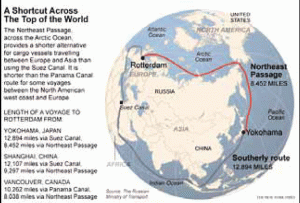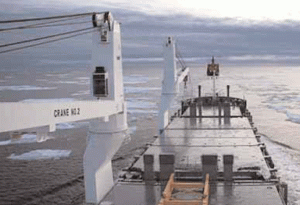Melting Arctic Shaves 4,000 Miles Off Vital Shipping Route
Businessmen, traders, and seafarers have spent hundreds of years wishing for a shortcut through the Arctic to ship goods between Asia and the West. Now, they’re about to get what they wished for: global warming has cleared out enough ice to allow a shipping route to cut directly through the Arctic-and the first ever vessel to make the voyage is about to finish the trip. Its success could herald the opening of the most important shipping passage since the Suez Canal.
Two German ships that set out from South Korea with 3,500 tons of construction materials are giving the new route its virgin run. If they’re successful, and so far the voyage has gone off without a hitch, the route will be embraced by traders in Europe, Asia, and North America. The new route runs through the Northeast Passage instead of the Suez Canal, and is thousands of miles shorter.
According to the New York Times, the shipping company, the Beluga Group, is currently en route through the Northeast Passage. And they’re well aware that it’s global warming that has allowed them to give the previously unthinkable passage a go.
The successful completion of the trip will mark the first-ever commercial voyage through the Northeast Passage. And while experts say that it will be a while before the Passage starts taking business from the Panama and Suez Canals, the world’s leading shipping channels, it will likely soon be a major player. It’s still a relatively treacherous passage,but global warming is taking care of that – fast.
From the Times
Sheets of pack ice still descend in hundred-mile-long tongues off the northern ice cap, and glaciers on the archipelagos off the coast shed icebergs that now drift more dangerously in the otherwise ice-free summer seas. But the route is rarely wholly impassable these days, according to the Russian Transport Ministry. And since we already know that the Arctic is shrin-king far faster than scientists had predicted (the Arctic Ocean may be ice-free by 2015), the already “rarely wholly impassable” is likely to soon become always wholly passable.
That might be a good thing for shipping companies and international business, in the short term – but it’s further evidence of how drastically, and dangerously, climate change is altering the world’s landscape. All that melting ice means more moisture in the air, and more severe storms – and rising sea levels. Both of which could spell serious trouble for the coastal cities to which the Arctic-faring ships deliver their goods to. We should be hoping that the Passage stays impassable, and that we can prevent climate change from fully opening up the world’s next Suez Canal for business.
Note
This article has been published in tbl with permission from TreeHugger, an online media outlet dedicated to driving sustainability mainstream.







